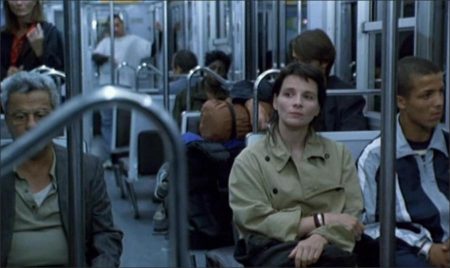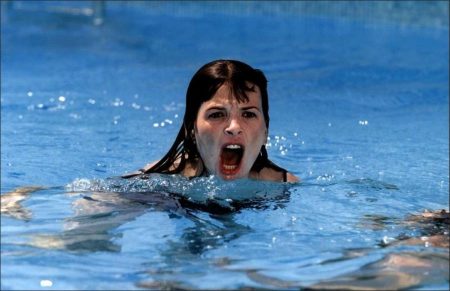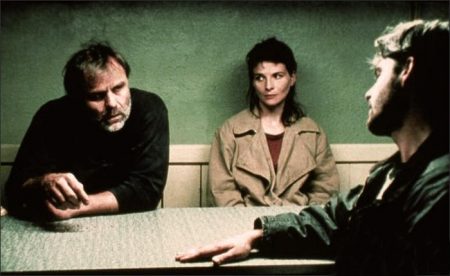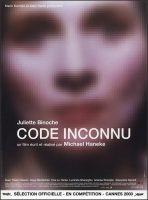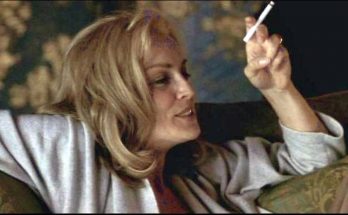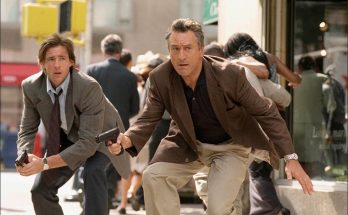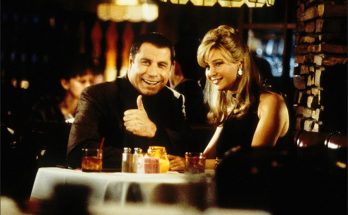Taglines: Love has a language all its own.
Jean, a farm lad, wants to escape his silent father; he runs to Paris to his older brother, Georges, who’s away covering the war in Kosovo. Angry, he throws a bag of half-eaten pastry into a beggar’s lap. Amadou, a young Franco-African, berates him. The police arrive, arrest Amadou and deport the beggar.
Georges’s girlfriend Anne is upset; it colors her relationship with Georges when he returns from the war. Separate lives intersect for the one moment, around the pastry bag, and all are altered. We follow each as repercussions of the incident play out. Deaf children bookend the film pantomiming words, feelings, and situations: what they are expressing?
Code Unknown (French: Code inconnu: Récit incomplet de divers voyages; English: Code Unknown: Incomplete Tales of Several Journeys) is a 2000 film directed by Michael Haneke. Most of the story occurs in Paris, France, where the fates of several characters intersect and connect.
Code Unknown is composed of unedited long takes filmed in real time, cut only when the perspective within a scene changes from one character’s to another’s in the middle of the action. A special edition of the film was released on Blu-ray in 2015 by The Criterion Collection. Code Unknown is a co-production among France, Germany and Romania.
Code Unknown screened in competition at the 2000 Cannes Film Festival. Cinematographer Jürges was nominated for the “Golden Frog” at the Camerimage awards. The film received votes from two critics and four directors, including Ruben Östlund, in the 2012 Sight & Sound polls of the world’s greatest films.
Film Review for Code Unknown
his film, from Austrian director Michael Haneke, is one of the most uncompromisingly difficult and challenging of the year: even after a number of viewings, I’m still not sure if what I have seen is a kind of high Euro-modernist masterpiece about race, culture, urban rage and alienated identity – or a perversely opaque and frustrating essay in enigma, a labyrinth of blind alleys, in which putative solutions are forbiddingly walled off.
It is a film which gestures at the literal incomprehensibility of experience, how it resists encirclement and extends beyond the perimeters of perception and interpretation. The mood of Code Unknown is moreover often fractious, crackling with unease and ill-humour, and yet this is a movie whose images and personae linger in the mind, and which can deliver dazzlingly generous, compassionate insights.
Code Unknown begins with a tense, violent encounter between a group of individuals in a Paris street, and then picks out separate stories for each of them. Various scenes of their lives are presented to us in no very obvious order, and then end as curtly and blankly as the view from a seafront telescope.
The movie begins with a key image – a kind of signature image – of inscrutability and inaccessibility. Jean (Alexandre Hamidi) is a teenager who has come to Paris from the country, where he loathes the farm life which his father is hoping he will want to inherit. He’s angling to crash at the small apartment belonging to his photojournalist brother Georges (Thierry Neuvic) and his wife Anne (Juliette Binoche).
But he doesn’t know the security code to let him into the building – so Jean hangs about until Anne comes out; she goes off to work but tells Jean the “code” so he can let himself in and relax, but he immediately gets into trouble. A young African guy Amadou (Ona Lu Yenke) starts a furious row with Jean about the contemptuous way he treats a Romanian beggar, Maria (Luminita Gheorghiu), and a brawl kicks off.
From here, Haneke gives us insights into the various lives that have intersected among the jolts and impacts of modern city living. But these scenes are not to be developed and interleaved in the manner of an Altman or a Paul Thomas Anderson, neither do they form an ingenious construct of perspectives of the sort offered by Tarantino. They are, in Haneke’s words, “incomplete journeys”. They have, through happenstance, and the nature of urban life which crunches lives and experiences together – often bruisingly – simply become entangled with each other.
Anne is an aspiring movie actress, and in one scene we are shown a disquieting audition sequence on video: she is trying out for the role of a serial killer’s victim, trapped in a room filling up with gas. In anguish, she pleads for her life: but it is some time before we can fully understand that this is not for real – and the consequent impression of evil hangs like a cloud. Amadou turns out to be a music teacher for deaf-mute children, but he is no saint: in fact, he is prickly and immature.
In one curious scene, he is shown on a date with a white girl in a restaurant where Anne happens also to be eating. He casually remarks he does not much like his companion’s watch; perhaps to embarrass him or show her utter disregard for bourgeois trappings, she takes it off and plonks it in an ashtray where a waiter takes it away. Amadou kisses her wrist. Is his objection to her watch arrogant, unpleasant – or just honest? The scene is baffling, and disconcerting, but arresting.
Maria is deported to Romania where the emotional heart of the film beats most strongly and clearly. She has a powerful scene in which she confesses her shame at begging and just as how she was disgusted by a beggar-woman to whom she once gave money, she recognised the revulsion on the face of a well-to-do Parisian about to give her a 20-franc note. Nothing I have seen in the cinema says as much about the geopolitics – even the metaphysics – of begging.
Many of the film’s tensest scenes take place on the Metro. Anne is insulted by a pair of Arab boys, who throughout complain that she is a racist. Georges sneaks a camera on to a train and takes covert snaps of faces – will his subjects guess what he is up to and angrily object? Should we, in fact, object at the implied arrogance of what Georges is up to? And, by that token, extend our disquiet to the chilly judgment implicit in Haneke’s gaze? All the time, the director keeps his audience off-balance.
And there is no narrative resolution to any of this. Like a densely written poem or complex piece of music, its images and tonalities are intriguing, but elusive. Code Unknown is therefore a movie which requires a considerable investment of attention. It offers a meditation on the confluence of lives and cultures in the modern city. It is bewildering and exasperating, certainly – but virile, cerebral film-making.
Code Unknown (2000)
Directed by: Michael Haneke
Starring: Juliette Binoche, Thierry Neuvic, Josef Bierbichler, Alexandre Hamidi, Maimouna Hélène Diarra, Ona Lu Yenke, Luminita Gheorghiu, Crenguta Hariton
Screenplay by: Michael Haneke
Production Design by: Emmanuel de Chauvigny
Cinematography by: Jürgen Jürges
Film Editing by: Karin Martusch, Nadine Muse, Andreas Prochaska
Costume Design by: Françoise Clavel, Gloria Papura
Art Direction by: Laurence Vendroux
Music by: Giba Gonçalves
Distributed by: MK2 Editions
Release Date: November 15, 2000
Visits: 49
